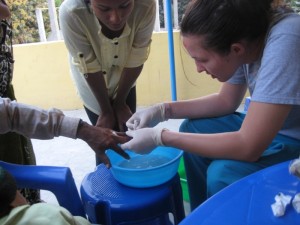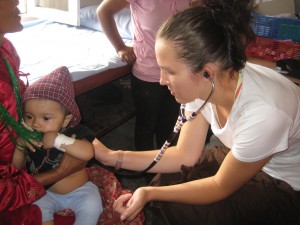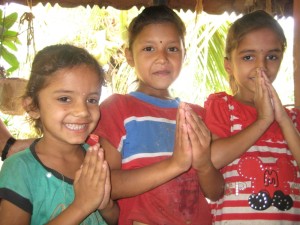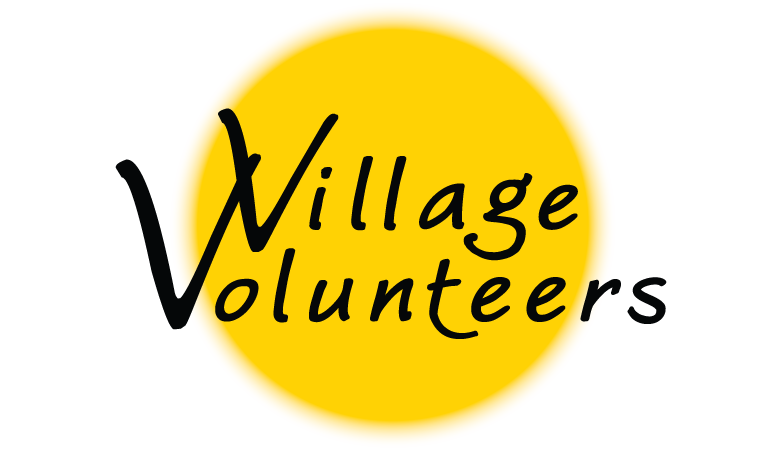 A jumble of Nepali voices dance through the darkness. There is nervous tension in the air. “Ke boyo? What happened?” At the center of a crowd stands a mother tightly grasping the hand of her frightened son. Despite her calm demeanor there is a sense of urgency in her eyes. Closer inspection reveals dried blood spattered across their hands. Mom slowly removes her thumb to reveal an open wound at the base of her son’s ring finger. Her son sliced his hand on a piece of sharp tin 30 minutes ago. We are the closest medical center for 80 kilometers and the only place available at seven at night. “Kripaya timi sahayog garna sakchau? Can you please help?” she pleads. My name is Briana Cranmer and I am a medical intern at the Chisang Clinic in the rural village of Bhawanne, Nepal.
A jumble of Nepali voices dance through the darkness. There is nervous tension in the air. “Ke boyo? What happened?” At the center of a crowd stands a mother tightly grasping the hand of her frightened son. Despite her calm demeanor there is a sense of urgency in her eyes. Closer inspection reveals dried blood spattered across their hands. Mom slowly removes her thumb to reveal an open wound at the base of her son’s ring finger. Her son sliced his hand on a piece of sharp tin 30 minutes ago. We are the closest medical center for 80 kilometers and the only place available at seven at night. “Kripaya timi sahayog garna sakchau? Can you please help?” she pleads. My name is Briana Cranmer and I am a medical intern at the Chisang Clinic in the rural village of Bhawanne, Nepal.
My medical career began five years ago while volunteering in village clinics across western Kenya with the organization Village Volunteers. It was these experiences that led me toward my life’s passion of providing care to underserved populations in remote areas lacking medical resources. After four months in Africa, I returned to the United States and began the pursuit of my medical degree in Family Medicine in conjunction with my Master’s in Public Health. In addition to my work in Kenya, I also worked alongside the Hopi, Navajo, and Apache American Indian tribes in the remote sections of northern Arizona and among Alaska Natives in central Alaska. My work in Nepal has simply been a natural extension of my zest for travel, medicine, and providing medical care to populations that lack access to adequate healthcare.
 The recently constructed Chisang Clinic, established in eastern Nepal, supports more than 30,000 people in over 15 villages. The overall goal of the clinic is to promote women’s health through the provision of gynecologic and obstetric care including antenatal, natal, and postnatal management as well as monthly Healthy Women Clinics. Chisang Clinic also strives to improve the health of youth through Healthy Child Clinics and monthly Immunization Clinics. Additionally, the clinic will provide use of the facility to local and international Non-Government Organizations for special outreach programs such as surgical correction of congenital deformities, post-burn contracture repairs, and eye and dental clinics. Beyond acute medical care, the clinic intends to promote community wellness through public health and disease prevention services designed to address local problems such as sexually transmitted infections and HIV, helicobacter pylori, diarrhea, and maternal and child health. Furthermore, volunteering in the Chisang Clinic is an invaluable opportunity to practice medicine without reliance on technology, to test your clinical knowledge, to expand your skills, and develop confidence as a physician. It is also an extraordinary experience in learning a new language, eating authentic food, immersing yourself in a unique culture, and experiencing an amazing country.
The recently constructed Chisang Clinic, established in eastern Nepal, supports more than 30,000 people in over 15 villages. The overall goal of the clinic is to promote women’s health through the provision of gynecologic and obstetric care including antenatal, natal, and postnatal management as well as monthly Healthy Women Clinics. Chisang Clinic also strives to improve the health of youth through Healthy Child Clinics and monthly Immunization Clinics. Additionally, the clinic will provide use of the facility to local and international Non-Government Organizations for special outreach programs such as surgical correction of congenital deformities, post-burn contracture repairs, and eye and dental clinics. Beyond acute medical care, the clinic intends to promote community wellness through public health and disease prevention services designed to address local problems such as sexually transmitted infections and HIV, helicobacter pylori, diarrhea, and maternal and child health. Furthermore, volunteering in the Chisang Clinic is an invaluable opportunity to practice medicine without reliance on technology, to test your clinical knowledge, to expand your skills, and develop confidence as a physician. It is also an extraordinary experience in learning a new language, eating authentic food, immersing yourself in a unique culture, and experiencing an amazing country.
Soap and water, a little lidocaine, and four stitches later the boy whispers, “Malai sutna man lagyo;” he is ready for bed. With a payment of 130 rupees ($1.75 USD) the audience disperses and clinic life settles back into the rhythm of the village. This patient is only a small representation of the many acutely and chronically ill that the Chisang Clinic is able to care for. The ease and speed with which the clinic Director Debendra Karki and Children’s Medical Aid Foundation Director Carol Vernal have established the Chisang Clinic reflects the strength of their determination and their commitment to the Bhawanee community.
 For a medical professional this is medicine at its essence. Where you use flashlights because the electricity does not turn on until 8:00 pm, where water is hand pumped from the ground because plumbing is questionable, and where tools are sterilized with boiled water because autoclaves are unrealistic. Where you are forced to rely on your stethoscope and ears because X-rays and ECG’s cost precious time and money, where you learn to trust your instincts because specialists are NOT a phone call away, where you hone your physical exam skills because lab tests are not readily available, and where appropriate patient management may mean the difference between a life-threatening ruptured appendicitis and a life-saving appendectomy. I am forever changed by this experience and thankful to be a part of such an impressive endeavor. If you are looking for an amazing experience or want to support the efforts of Chisang Clinic be reassured that this is truly a once in a lifetime opportunity; unless you do it twice.
For a medical professional this is medicine at its essence. Where you use flashlights because the electricity does not turn on until 8:00 pm, where water is hand pumped from the ground because plumbing is questionable, and where tools are sterilized with boiled water because autoclaves are unrealistic. Where you are forced to rely on your stethoscope and ears because X-rays and ECG’s cost precious time and money, where you learn to trust your instincts because specialists are NOT a phone call away, where you hone your physical exam skills because lab tests are not readily available, and where appropriate patient management may mean the difference between a life-threatening ruptured appendicitis and a life-saving appendectomy. I am forever changed by this experience and thankful to be a part of such an impressive endeavor. If you are looking for an amazing experience or want to support the efforts of Chisang Clinic be reassured that this is truly a once in a lifetime opportunity; unless you do it twice.
Briana Cramner
U. S. A.
May 2012
